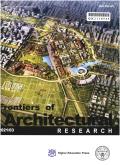基于优化的建筑体量类型设计探索--EvoMass 和面向类型的计算设计优化方法,用于早期阶段基于性能的建筑体量设计
IF 3.1
1区 艺术学
0 ARCHITECTURE
引用次数: 0
摘要
在过去十年中,人们越来越认识到计算设计优化在早期阶段基于性能的建筑设计探索中的作用。然而,对于设计师来说,在实践中应用这种基于优化的设计探索仍然具有挑战性。为了解决这个问题,本文介绍了一种名为 EvoMass 的设计工具和相关的设计方法,它有助于在基于性能的设计任务中对建筑体量类型进行设计探索。EvoMass 能够为建筑师提供设计方案,反映与设计任务相关的建筑体量类型,而无需高级计算设计技能。更重要的是,它能让建筑师深入了解潜在的性能影响,从而加强早期阶段基于性能的设计探索。EvoMass 及其相关设计方法克服了大多数现有工具所采用的先类型-优化-再设计的传统程序的局限性,推广了一种以类型为导向的设计探索方法,即在基于性能的建筑设计中使用计算优化方法。为了展示 EvoMass 的功效,我们介绍了来自建筑设计工作室任务的案例研究,包括日光照明、太阳曝晒和主观设计意图,以及用户调查的结果,突出了 EvoMass 和基于性能的设计优化和探索如何使建筑师实现更具性能意识的设计。本文章由计算机程序翻译,如有差异,请以英文原文为准。
Optimization-based design exploration of building massing typologies—EvoMass and a typology-oriented computational design optimization method for early-stage performance-based building massing design
In the past decade, there has been an increasing recognition of the role of computational design optimization in early-stage performance-based architectural design exploration. However, it remains challenging for designers to apply such optimization-based design explorations in practice. To address this issue, this paper introduces a design tool, called EvoMass, and an associated design method that facilitates design exploration for building massing typologies in performance-based design tasks. EvoMass is capable of offering architects design options reflecting performance-related building massing typologies for the design task, without necessitating advanced computational design skills. More importantly, it can provide architects with insights into the underlying performance implications, thereby enhancing early-stage performance-based design exploration. EvoMass and its associated design method overcome the limitation in the conventional typology-first-optimization-second design procedure adopted by most existing tools, and it promotes a typology-oriented design exploration method of using computational optimization in performance-based architectural design. To demonstrate the efficacy of EvoMass, case studies derived from architectural design studio tasks, incorporating daylighting, solar exposure, and subjective design intents, and the result of a user survey are presented, which highlights how EvoMass and the performance-based design optimization and exploration can enable architects to achieve a more performance-aware design.
求助全文
通过发布文献求助,成功后即可免费获取论文全文。
去求助
来源期刊

Frontiers of Architectural Research
ARCHITECTURE-
CiteScore
6.20
自引率
2.90%
发文量
430
审稿时长
30 weeks
期刊介绍:
Frontiers of Architectural Research is an international journal that publishes original research papers, review articles, and case studies to promote rapid communication and exchange among scholars, architects, and engineers. This journal introduces and reviews significant and pioneering achievements in the field of architecture research. Subject areas include the primary branches of architecture, such as architectural design and theory, architectural science and technology, urban planning, landscaping architecture, existing building renovation, and architectural heritage conservation. The journal encourages studies based on a rigorous scientific approach and state-of-the-art technology. All published papers reflect original research works and basic theories, models, computing, and design in architecture. High-quality papers addressing the social aspects of architecture are also welcome. This journal is strictly peer-reviewed and accepts only original manuscripts submitted in English.
 求助内容:
求助内容: 应助结果提醒方式:
应助结果提醒方式:


